
London is in “serious danger of losing its vital support system of micro and small businesses”, the Federation of Small Businesses has warned ahead of the government’s controversial business rate rise.
The warning comes after the campaign group found that the average small business will have to pay £17,000 to cover business rates from April, with almost 75 percent of small companies in London worried about the negative effects.
The changes come following the first revaluation of business rates for seven years and have provoked uproar from several business campaign groups, after it was found that more than 500,000 cafes, shops, hotels, nurseries, schools and hospitals will pay up to 300 per cent more under the new rules.
Business campaign groups speaking out against the changes include the British Retail Consortium, the Confederation of British Industry and the Federation of Small Businesses. Some have argued that it could even be illegal under local government finance laws.
The changes led to further controversy after it was found that online retail giant Amazon would benefit from the changes, seeing its business levy slashed at most of its warehouses across the UK. Other online retailers who are set to benefit include Asos and Boohoo.
A survey by the FSB and trade body Camden Town Unlimited, found that rates were the biggest issue for 74 percent of small businesses in London.
Four in 10 businesses that are paying rates said they expected a rise of more than 20 percent, while three in 10 said they were unsure what the changes from April would mean.
Sue Terpilowski, the FSB London chair, said: “London is in serious danger of losing its vital support system of micro and small businesses.
“The business attraction of London is that it has a strong ecosystem of support services from the micro and small business community. Some of these businesses are the ones that become high-growth companies from a standing start, often in the hi-tech sectors.”
